
Karl-Otto Koch was a mid-ranking commander in the Schutzstaffel (SS) of Nazi Germany who was the first commandant of the Nazi concentration camps at Buchenwald and Sachsenhausen. From September 1941 until August 1942, he served as the first commandant of the Majdanek concentration camp in occupied Poland, stealing vast amounts of valuables and money from murdered Jews. His wife, Ilse Koch, also participated in the crimes at Buchenwald.
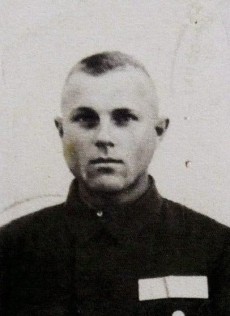
John Demjanjuk was a Trawniki man and Nazi camp guard at Sobibor extermination camp, Majdanek, and Flossenbürg. Demjanjuk became the center of global media attention in the 1980s, when he was tried and convicted in Israel after being misidentified as "Ivan the Terrible", a notoriously cruel watchman at Treblinka extermination camp. In 1993 the verdict was overturned. Shortly before his death, he was tried and convicted in the Federal Republic of Germany as an accessory to the 28,060 murders that occurred during his service at Sobibor.
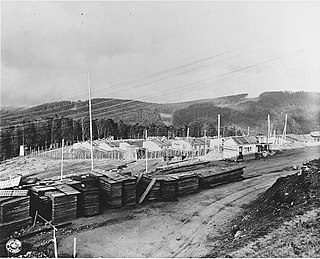
Natzweiler-Struthof was a Nazi concentration camp located in the Vosges Mountains close to the villages of Natzweiler and Struthof in the Gau Baden-Alsace of Germany, on territory annexed from France on a de facto basis in 1940. It operated from 21 May 1941 to September 1944, and was the only concentration camp established by the Germans in the territory of pre-war France. The camp was located in a heavily forested and isolated area at an elevation of 800 metres (2,600 ft).

Ilse Koch was a German war criminal who committed atrocities while her husband Karl-Otto Koch was commandant at Buchenwald. Though Ilse Koch had no official position in the Nazi state, she became one of the most infamous Nazi figures at war's end and was referred to as the "Kommandeuse of Buchenwald".

Stutthof was a Nazi concentration camp established by Nazi Germany in a secluded, marshy, and wooded area near the village of Stutthof 34 km (21 mi) east of the city of Danzig (Gdańsk) in the territory of the German-annexed Free City of Danzig. The camp was set up around existing structures after the invasion of Poland in World War II and initially used for the imprisonment of Polish leaders and intelligentsia. The actual barracks were built the following year by prisoners. Most of the infrastructure of the concentration camp was either destroyed or dismantled shortly after the war. In 1962, the former concentration camp with its remaining structures, was turned into a memorial museum.

Bromberg-Ost was the female subcamp of the German Nazi concentration camp KL Stutthof between 1944-1945, set up in the city of Bydgoszcz during the later stages of World War II. The mostly Jewish women prisoners dispatched from the main camp in Sztutowo worked as slave-labour for the German railways; loading cargo, clearing and repairing tracks, and digging ditches. The commandant of the camp was SS-Scharführer Anton Kniffke.

Richard Baer was a German SS officer who, among other assignments, was the final commandant of Auschwitz I concentration camp from May 1944 to January 1945, and right after, from February to April 1945, commandant of Mittelbau-Dora concentration camp. Following the war, Baer lived under an assumed name to avoid prosecution but was recognized and arrested in December 1960. He died in detention before he could stand trial.

Sachsenhausen or Sachsenhausen-Oranienburg was a German Nazi concentration camp in Oranienburg, Germany, used from 1936 until April 1945, shortly before the defeat of Nazi Germany in May later that year. It mainly held political prisoners throughout World War II. Prominent prisoners included Joseph Stalin's oldest son, Yakov Dzhugashvili; assassin Herschel Grynszpan; Paul Reynaud, the penultimate prime minister of the French Third Republic; Francisco Largo Caballero, prime minister of the Second Spanish Republic during the Spanish Civil War; the wife and children of the crown prince of Bavaria; Ukrainian nationalist leader Stepan Bandera; and several enemy soldiers and political dissidents.

Alice Orlowski was a German concentration camp guard at several of the Nazi concentration camps in German-occupied Poland (1939-1945) during World War II. After the war, a Polish court convicted of her crimes against humanity, and she served 10 years in prison in Poland. In 1973, Orlowski, now 70 and living as a pensioner in West Germany, muttered that only "half the work" had been finished, referring to the Holocaust. She was promptly arrested, convicted of making antisemitic remarks, and sentenced to 10 months in prison.
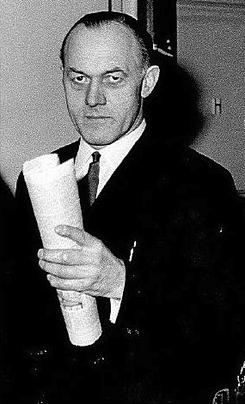
Josef Kaspar Oberhauser was a low-ranking German SS commander during the Nazi era. He participated in Action T4 and Operation Reinhard. Oberhauser was the only person to be successfully convicted of crimes committed at the Belzec extermination camp. He was charged with 450,000 counts of accessory to murder and sentenced to 4.5 years imprisonment during the Belzec Trial of 1964.

Fritz Klein was a Romanian-German Nazi doctor and war criminal, hanged for his role in atrocities at Auschwitz concentration camp and Bergen-Belsen concentration camp during the Holocaust.

The Stutthof trials were a series of war crime tribunals held in postwar Poland for the prosecution of Stutthof concentration camp staff and officials, responsible for the murder of up to 85,000 prisoners during the occupation of Poland by Nazi Germany in World War II. None of the Stutthof commandants were ever tried in Poland. SS-Sturmbannführer Max Pauly was put on trial by a British military court in Germany but not for the crimes committed at Stutthof; only as the commandant of the Neuengamme concentration camp in Hamburg. Nevertheless, Pauly was executed in 1946.

Kurt Eccarius was an SS functionary during the Nazi era; he was in charge of the prison block inside the Sachsenhausen concentration camp from 1939 to 1945. He was convicted by both Soviet and West German courts for murders committed during his concentration camp service.

The two Treblinka trials concerning the Treblinka extermination camp personnel began in 1964. Held at Düsseldorf in West Germany, they were the two judicial trials in a series of similar war crime trials held during the early 1960s, such as the Jerusalem Adolf Eichmann trial (1961) and the Frankfurt Auschwitz Trials (1963–65), as a result of which the general public came to realize the extent of the crimes that some two decades earlier had been perpetrated in occupied Poland by German bureaucrats and their willing executioners. In the subsequent years, separate trials dealt with personnel of the Bełżec (1963–65), Sobibor (1966), and Majdanek (1975–81) extermination camps.
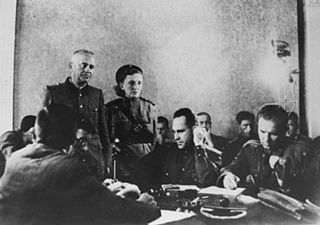
The Majdanek trials were a series of consecutive war-crime trials held in Poland and in Germany during and after World War II, constituting the overall longest Nazi war crimes trial in history spanning over 30 years. The first judicial trial of Majdanek extermination camp officials took place from November 27, 1944, to December 2, 1944, in Lublin, Poland. The last one, held at the District Court of Düsseldorf began on November 26, 1975, and concluded on June 30, 1981. It was West Germany's longest and most expensive trial, lasting 474 sessions.
Reinhold Hanning was an SS guard at the Auschwitz concentration camp in occupied Poland.

Justice Thomas Walther is a lawyer based in Kempten, in the province of Bavaria in Germany. He is a former judge and German federal prosecutor for the Central Office of the State Justice Administrations for the Investigation of National Socialist Crimes. He is known as the "last of the Nazi hunters" for his work in setting legal precedent in seeking punishment for former SS officers and guards who were involved in the Holocaust, whether directly responsible for deaths or not.
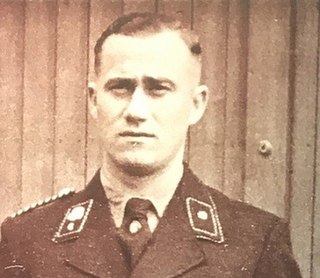
Roland Puhr was an SS-Unterscharführer who committed numerous atrocities at Sachsenhausen concentration camp during World War II. After the war, he settled down in East Germany using forged papers. Puhr was exposed as a war criminal in 1963, and executed the following year.
















